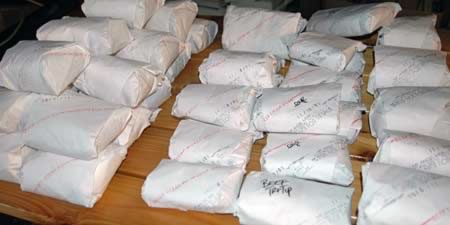How to buy a side of beef
Kris and I grow our own berries. We harvest walnuts from a tree in the yard, and glean hazelnuts from a friend's orchard. We keep fruit trees and a vegetable garden. For city folk, we try to grow as much of our own food as possible. But one thing we cannot grow is our own meat. We've discovered the next best thing, though: we buy beef in bulk from a local rancher. Every year, we pool our money with three other couples to purchase an animal when it's ready to be slaughtered. In early December, we bring home about one hundred pounds of meat.

Buying beef in bulk can be an excellent deal, but not for everyone. Buying a side of beef is a good choice if you like to cook, you eat a lot of meat, you have storage space, and quality is important to you.
The advantages of buying in bulk include:
Review: Kill-a-Watt electricity usage monitor
 In June I shared some tips for reducing home energy costs. Most of the information came from Michael Bluejay's excellent guide to saving electricity. I was curious how much electricity invidual appliances use, so I ordered a gadget that Bluejay recommends: the Kill-a-Watt electricity meter. The official website declares:
In June I shared some tips for reducing home energy costs. Most of the information came from Michael Bluejay's excellent guide to saving electricity. I was curious how much electricity invidual appliances use, so I ordered a gadget that Bluejay recommends: the Kill-a-Watt electricity meter. The official website declares:
Connect your appliances into the Kill A Watt™, and assess how efficient they are. A large LCD display counts consumption by the Kilowatt-hour just like utility companies. You can figure out your electrical expenses by the hour, day, week, month, even an entire year. Monitor the quality of your power by displaying Voltage, Line Frequency, and Power Factor.
I've gone through our house and measured the power consumption of random devices: Continue reading...
Secrets of the Millionaire Mind

Initially, T. Harv Eker's Secrets of the Millionaire Mind: Mastering the Inner Game of Wealth seems cast from the same mold as Loral Langemeier's The Millionaire Maker (my review): full of vague promises, unsupported claims, and thinly-veiled sales pitches for products and seminars. It's true that Eker is guilty of some of these faults. But ultimately I could not help but like the book once I stopped thinking of it as a personal finance guide and began to consider it as a motivational tool.
I'm sure that many people would dismiss Secrets of the Millionaire Mind as useless. There's not a lot of concrete information here about how to improve the details of your financial life. (Though the scant advice presented is sound). Instead, this book encourages readers to adopt mental attitudes that facilitate wealth. It's about changing your psychological approach to money, success, and happiness.
What Do You Want to Be When You Grow Up?
How can you know what you want
Till you get what you want
And you see if you like it?
— Steven Sondheim, Into the Woods
We had some good friends over for dinner the other night. While we waited for the roast to finish, Wayne and I took the air on the back porch. We talked about work. I told him that this is a slow time of year at the box factory.
"Yeah," he said. "It's slow for us at the dealership, too. The last three weeks have been awful." Wayne works for a local car dealership. He recently moved from sales to finance. He's the hardest worker I know, often putting in six ten-hour (or twelve-hour!) days in a single week. Continue reading...
How Do You Teach Kids the Value of Money?
At the grocery store yesterday, I passed a man and his daughter in the snack aisle. She was maybe ten or eleven, a little overweight, and begging for cookies. He was tall and muscular, a blue-collar type, clearly exasperated with her. "You have no conception of how hard your mother and I work to earn money, do you?" he said. There was desperation in his voice.
This brief encounter has been in my mind ever since. It reminds me of something I read over at the Seeds of Wisdom forum. Jim Anthony shared a story about how he is teaching his six-year-old the value of money. Anthony doesn't like the idea of just giving his son money — he thought it created an "entitlement mentality" — but he doesn't like the idea of tying the allowance to chores, either.
The big problem I see with either of these methods is that most parents don't teach any lessons beyond this and their kids learn that money is for spending on stuff, period. There are no lessons about making money earn more money. There are no lessons about the actual value of money.
Getting Things Done: How to take control of life
Taking control of your finances is easier when the rest of your life is in order. If your mind is swamped with worries about work, or home improvement projects, or obligations to friends and family, personal finance can become a low priority. You have other Stuff to worry about.
David Allen's Getting Things Done provides a system for tackling all of the Stuff in your life. I've avoided mentioning Getting Things Done before today. But I'm currently writing a couple of articles that will make more sense if you're familiar the concept, so an introduction is in order.
Introduction

Getting Things Done (GTD) is about productivity. Its aim is to help you do more while feeling less stressed. Rather than explain the system — other sites have done so already — I want to share how I implemented it in my own life. Since I didn't follow things to the letter, and since many of you are probably unfamiliar with GTD, I'll begin with a brief description. The following has been simplified.
How to Create a Will: A Guide to Get Started with Making a Will
It's Halloween — time for a scary, morbid subject.
Young adults don't think about wills. The typical person graduates from college, gets a job, marries his sweetheart, has children, and never considers a will until he turns fifty. But not everyone lives to be fifty. You can't always see death coming. A will is for anyone with money and possessions that need to be distributed according to some plan.
A Lifehacker reader recently asked about drafting a will: Continue reading...
How to Get the Most Out of a College Job
A college job can be a chore. Or it can be the doorway to future success. The choice is yours.
I asked Michael Hampton, director of career development for Western Oregon University, for advice on how college students should approach work. What should they look for in a job? What should they try to get out of it? Are college jobs really that important? We drafted the following seven tips, which we believe can help you to get the most out of your college work experience.
Connect Jobs With the Future
Try to connect your jobs — even part-time jobs — with something you enjoy doing. Ideally each job would relate to something you think you might want to do later in life. (This isn't always possible — it's an ideal.) This can help you determine if the job is actually a good fit. Test-drive jobs like you would test-drive cars. Students often think they want the prestige and feel of the glamorous BMW/Lexus job, but after a while they realize they're better suited for a Honda/Nissan job. The opposite happens, too.
Frugality in practice: Shopping for second-hand clothes
On a street corner near our house is a store called The Dig, which advertises "most clothes $3 - $4 - $5". Many of these are items of the latest fashions, which have been rejected for whatever reason. Clean and organized, the store also has dressing rooms, something many thrift stores lack. I used to mock Kris for going to The Dig. It looked like a dive. Then I joined her for a trip a couple of weeks ago — now I'm a convert.
I buy most of my clothing at one of two places: Costco or the local thrift shops. It makes me wince to pay more than $20 for a piece of clothing. (Unless it's something top quality, like a Filson jacket, in which case I'll gladly pay $150.) Costco has styles I like, but the selection is limited, and the prices are three times those at thrift stores. Thrift stores have a huge selection, but the garments are often flawed. And to find anything good, you have to sort through tons of junk.
Used clothing stores like The Dig are a compromise. The prices are better than at Costco. The selection isn't as wide as you might find at a thrift store, but the quality is generally better. Here are some tips about shopping for second-hand clothes. (Kris gave a lot of help with these.) Continue reading...
What happens when you try to get rich quickly
Robert Kiyosaki, Robert Allen, and Loral Langemeier would have you believe that in order to get rich all you need to do is throw your money into real estate, sit back, and let the profits come. It's not that simple. There's risk involved. You have to know what you're doing.
Jon forwarded a link to what he calls "a personal finance trainwreck". He writes: "If this guy is for real (and there appears to be some suspicion about that) then, wow. Unbelievable." Casey at iamfacingforeclosure.com thought he could make a killing at real estate. He wanted to reach Financial Independence quickly.
I'm a 24-year-old aspiring real estate investor from Sacramento, California. After going to few seminars I bought eight houses in eight months across four states with no money down. I fixed and sold two and then ran out of cash. I am now facing foreclosure on
sixfive houses. I'm learning my lessons, finding solutions and blogging about it.
Become A Money Boss And Join 15,000 Others
Subscribe to the GRS Insider (FREE) and we’ll give you a copy of the Money Boss Manifesto (also FREE)
